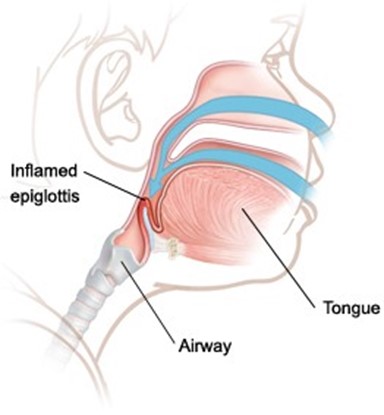The nurse is assessing a child with acute epiglottitis.
Examining the child’s throat by using a tongue depressor might precipitate which symptom or condition?
Inspiratory stridor
Complete obstruction
Sore throat
Respiratory tract infection
The Correct Answer is B
If a child has acute epiglottitis, examination of the throat may cause complete obstruction and should be performed only when immediate intubation can take place.

This is because the inflamed epiglottis can block the airway and cause respiratory distress or failure.
Choice A is wrong because inspiratory stridor is a sign of upper airway obstruction that is aggravated when a child with epiglottitis is supine.
It is not caused by examining the throat with a tongue depressor.
Choice C is wrong because sore throat and pain on swallowing are early signs of epiglottitis, not precipitated by examining the throat with a tongue depressor.
Choice D is wrong because respiratory tract infection is the cause of epiglottitis, not a symptom or condition that is precipitated by examining the throat with a tongue depressor.
Epiglottitis is caused by H. influenzae in the respiratory tract.
Nursing Test Bank
Naxlex Comprehensive Predictor Exams
Related Questions
Correct Answer is B
Explanation
Measles (rubeola) is a communicable disease that is characterized by Koplik’s spots, which are clustered, white lesions on the buccal mucosa opposite the lower molars. They appear two to three days before the measles rash and are pathognomonic for measles.
Choice A is wrong because rubella is a different viral infection that causes a mild rash and fever, but does not have Koplik’s spots.
Choice C is wrong because chickenpox (varicella) is caused by the varicella-zoster virus and produces fluid-filled blisters on the skin, not white spots in the mouth.
Choice D is wrong because exanthema subitum (roseola) is caused by the human herpesvirus 6 or 7 and causes a high fever followed by a pink rash on the trunk and neck, but no oral lesions.
Correct Answer is C
Explanation
Bacteria that synthesize vitamin K is not present in the newborn’s intestinal tract. Vitamin K is essential for blood clotting, and newborns are at risk of bleeding problems due to their lack of vitamin K. Therefore, vitamin K is given by injection to prevent hemorrhagic disease in the newborn.

Choice A is wrong because most mothers do not have a diet deficient in vitamin K, and vitamin K deficiency in newborns is not related to the maternal diet.
Choice B is wrong because vitamin K does not prevent the synthesis of prothrombin in the liver, but rather enhances it. Prothrombin is a clotting factor that requires vitamin K for its production.
Choice D is wrong because the supply of vitamin K is not inadequate for at least 3 to 4 months, but rather for a few days until the newborn’s intestinal bacteria start producing it.
Whether you are a student looking to ace your exams or a practicing nurse seeking to enhance your expertise , our nursing education contents will empower you with the confidence and competence to make a difference in the lives of patients and become a respected leader in the healthcare field.
Visit Naxlex, invest in your future and unlock endless possibilities with our unparalleled nursing education contents today
Report Wrong Answer on the Current Question
Do you disagree with the answer? If yes, what is your expected answer? Explain.
Kindly be descriptive with the issue you are facing.
